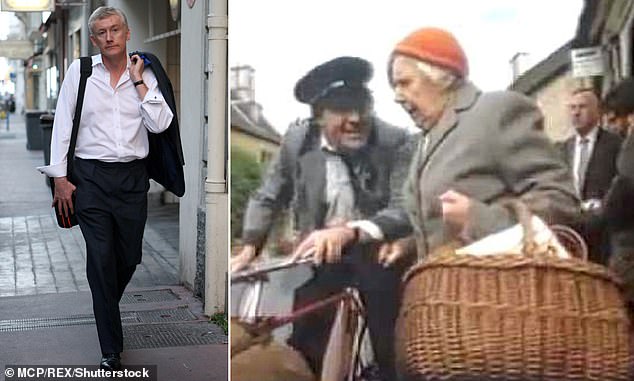Retail offers of shares, owned by government, are a rare event in the post-privatisation era. So it is not that surprising the hype is building for what is being described as a ‘Tell Sid’ offer – a throwback to the British Gas sell-off in 1986 – for part of the 35 per cent government stake in NatWest.
The holding is a legacy of the government bailout during the great financial crisis of 2008 when the bank’s cash dispensing machines came within minutes of running dry.
Preparations for a 2024 sale, including the offer to private investors, are underway and barring stock market volatility, the biggest government share disposal since the privatisation of Royal Mail a decade ago could be launched in late spring or early summer.
At NatWest headquarters in Edinburgh and Bishopsgate in the City, material is being assembled for a prospectus. Goldman Sachs, which acts for UK Government Investments, is on alert and a search is on for an agency to lead a marketing campaign aimed at citizen investors. Private investors are expected to be lured in with discounts on the offer price or bonuses for those who hold on to their shares – or a combination of both.
Exciting as all this might appear as a longstanding investor in NatWest – in its previous Royal Bank of Scotland guise – my advice would be to steer well clear.

Flashback: The ‘Tell Sid’ ads from the 1986 British Gas sell-off. Left: Ex-RBS boss Fred Goodwin
As a City Editor, my self-imposed rule is to hold stock and never to trade. Keen as one may be on investing in Britain for the long-term, my loyalty to NatWest has been an unmitigated financial disaster. My original investment has been decimated over time by serial mismanagement.
As worrying, as a customer for more than half a century in one of NatWest’s constituent banks, service levels have been devastated. Branches have vanished and will continue to do so. Basic financial services ranging from stockbroking to safe-keeping of documents have been abolished. In the desperate effort to cut costs, boost profits and free itself from government control, the bank’s raison d’etre is barely discernible.
I will always remember my first very different encounter with our family’s local manager at the Brighton branch of the District Bank, which as a result of a series of mergers, became part of the National Westminster. Before I set off to university, my father, a farmer with a retail outlet in Hove, accompanied me to the bank to open my first account.
We were ushered into the manager’s office and welcomed with a cup of tea and a bourbon biscuit. Forms were completed, a standing order for a regular allowance from my father Michael set up and the account opened. The basics of writing out cheques and trying to stay in credit were explained.
It was the beginning of a personal relationship which helped see me through many life events – a joint account after marriage, working overseas for a decade and returning to London to face a horrendous mortgage rate (more than 14 per cent) and school fees for three children. There were overdrafts and tensions but successive managers, firstly in Brighton and later in Putney in South-West London, saw me through the personal traumas.
In a parallel life in financial journalism I encountered Fred Goodwin, the go-getting chief executive who led NatWest’s parent, the Royal Bank of Scotland, on the road to ruin. Goodwin embarked on a series of mergers in the US and around the world culminating in the disastrous £49 billion takeover of Dutch-Belgian financial group ABN Amro – the largest bank deal of all time – in October 2007.
By then the earthquake, stemming from American sub-prime mortgages which went bad, should have been dialling up the warnings. US investment bank Bear Stearns had been rescued by JP Morgan and Northern Rock bailed out by the Bank of England after a shameful public run on the bank. Goodwin pressed on, in spite of a calamitous drop in the RBS-NatWest share price.
By the spring of 2008, the scale of the misjudgment was evident and Fred Goodwin was required by the City regulator to boost the bank’s capital with a record-breaking rights issue to existing shareholders to raise £12 billion. I recall a routine visit to the Prudential, then one of the City’s cornerstone investors, with a 3 per cent stake in most FTSE 100 companies.
The investment chief gleefully recalled how Goodwin, who never bothered before, had personally come a calling to persuade the Pru to buy into the rights issue to support the shares. As an existing investor, I decided to subscribe thinking that the discounted shares were so cheap nothing could go wrong.

Example: Alex Brummer’s father Michael helped open an account
That summer I was invited to a lunch of pigeon salad (I had the veggie alternative) at the Bank’s Bishopsgate HQ. Goodwin was still breezily confident of seeing through the impending crisis telling me of how when he was in London, he would stay in a suite at the Savoy hotel where the efficient valet service ensured his clothes were cleaned and pressed. Any suggestion that RBS was in difficulty was dismissed.
As the financial crisis gathered momentum in 2008, RBS shares plummeted 87 per cent. On the morning of October 7 as Goodwin was giving an upbeat presentation about the brilliant future ahead of the bank, the shares sunk another 35 per cent. The hedge funds had smelt blood.
Chairman Tom McKillop called the Chancellor Alistair Darling in a blind panic and the Bank of England covertly made tens of billions of pounds available. By December 2009, the government found itself owning 49 per cent of the bank which remained a loss maker for the next decade.
Ruthless shrinking of the balance sheet and several chief executives later we are expected to believe that NatWest has turned the corner. Maybe, but it has a nasty habit of slipping on banana skin. This was the case last year when chief executive Dame Alison Rose was forced from office by the board, after a government intervention, when she had provided personal details about Brexit veteran Nigel Farage’s banking arrangements with the exclusive private bank offshoot Coutts.
NatWest is once again in new hands under the capable leadership of interim chief executive Paul Thwaite and incoming chairman Rick Haythornthwaite. We are assured that with steady hands on the tiller, the future looks rosy. An era of higher interest rates has improved returns. But can anyone ever be certain that a bank with such a dismal history will ever be a good investment.
As a customer and shareholder I have been a double loser. My shares are worth a fraction of the value at the time of the calamitous rights issue of 2008 and the subsequent near collapse. But I am equally dismayed by the closure of my local branch, the end of services such as safekeeping, the substitution of the personal touch with an ill-programmed online advice service familiarly called Cora.
It is not good enough. It has long been my belief that the government should have sold its NatWest stake, albeit at a loss, many years ago. But I find the idea of buying into a new retail offer abhorrent.
Haven’t all NatWest private shareholders suffered enough already!
Some links in this article may be affiliate links. If you click on them we may earn a small commission. That helps us fund This Is Money, and keep it free to use. We do not write articles to promote products. We do not allow any commercial relationship to affect our editorial independence.



